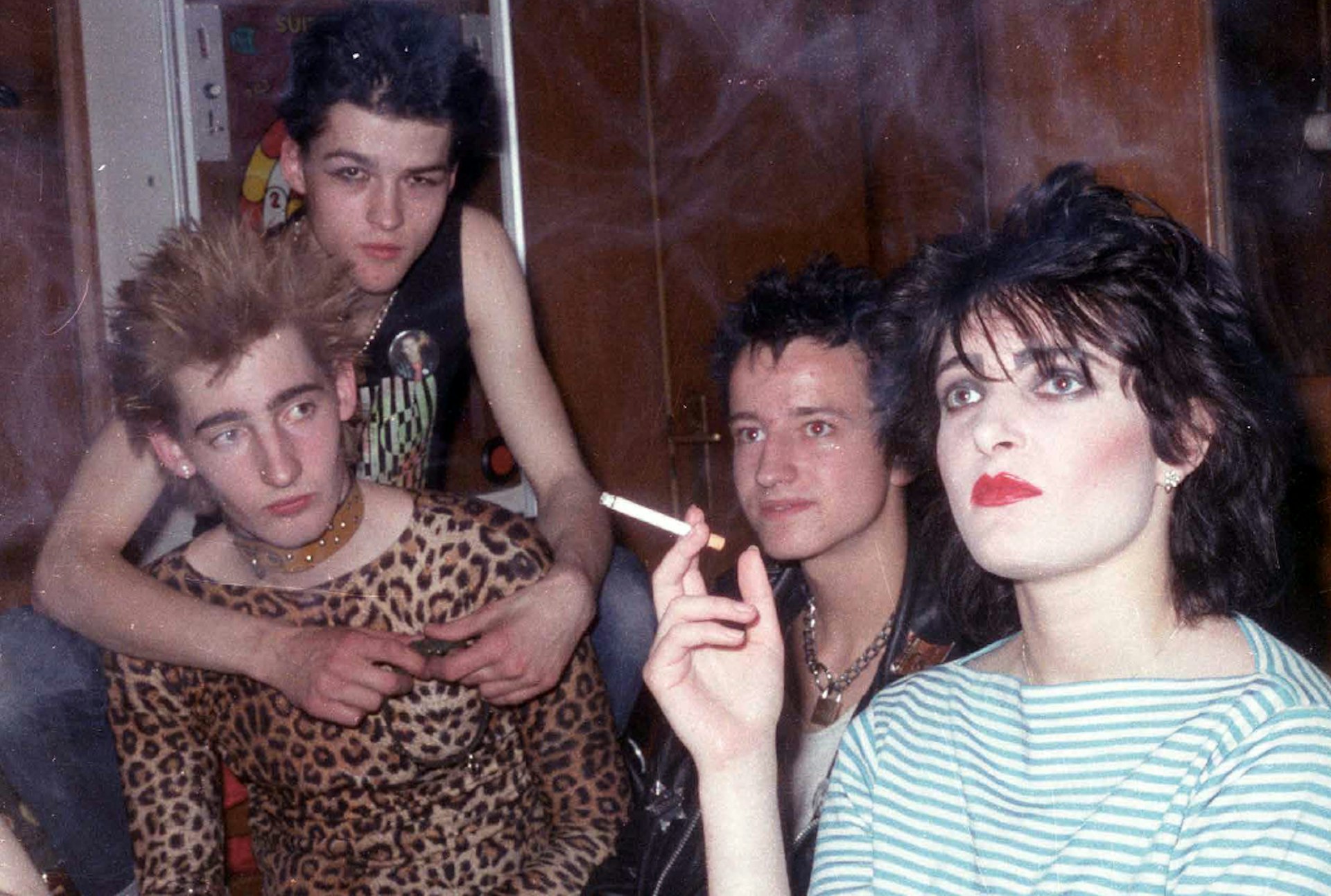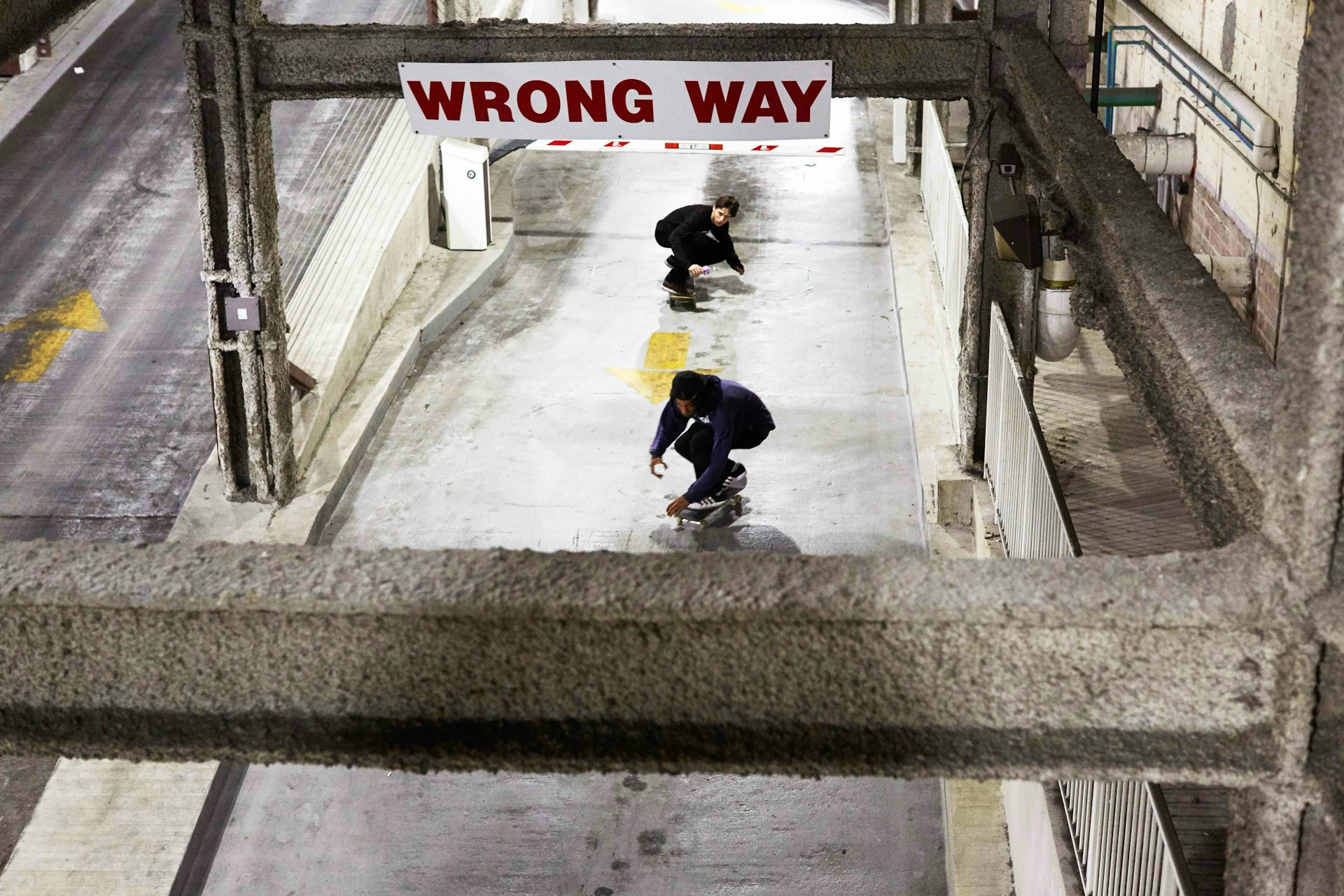
How New Orleans' skate scene became a home for outsiders
- Text by Adam Karlin
- Photography by Henry Hung
In the shadow of One Shell Square, the guys assemble. They carve the sidewalks and asphalt in arcing loops. They grind the curbs and shit-talk, sharing words of encouragement, jumping over whatever: a bit of trash, a stray skateboard, even each other.
This spot is a quick walk from the edge of the French Quarter, New Orleans’ most iconic neighbourhood. The Quarter was the original French (then Spanish, then French again) city from which the rest of this town formed. It’s filled with elegant Spanish Caribbean townhouses, brick courtyards shaded by palm trees, as well as wrought iron that spreads like dark spider webs across open-air balconies.
One Shell, the tallest structure in New Orleans, feels like a modernist middle finger pointed at the historical homes a few blocks away. For most Louisianans, this building symbolises corporate power. But for the guys skating in its shadow, One Shell is just another gathering spot for the usual Friday night freestyle.
There are maybe a dozen skaters gathered tonight. Troy Lacabe, 21, hangs out despite not having a board. These are his best friends, he says, his homies. There’s nowhere else he wants to be. One of them rolls a blunt with a Backwoods wrapper while someone else talks about skating at Parasite, a skatepark built from the grassroots up by local advocacy groups.
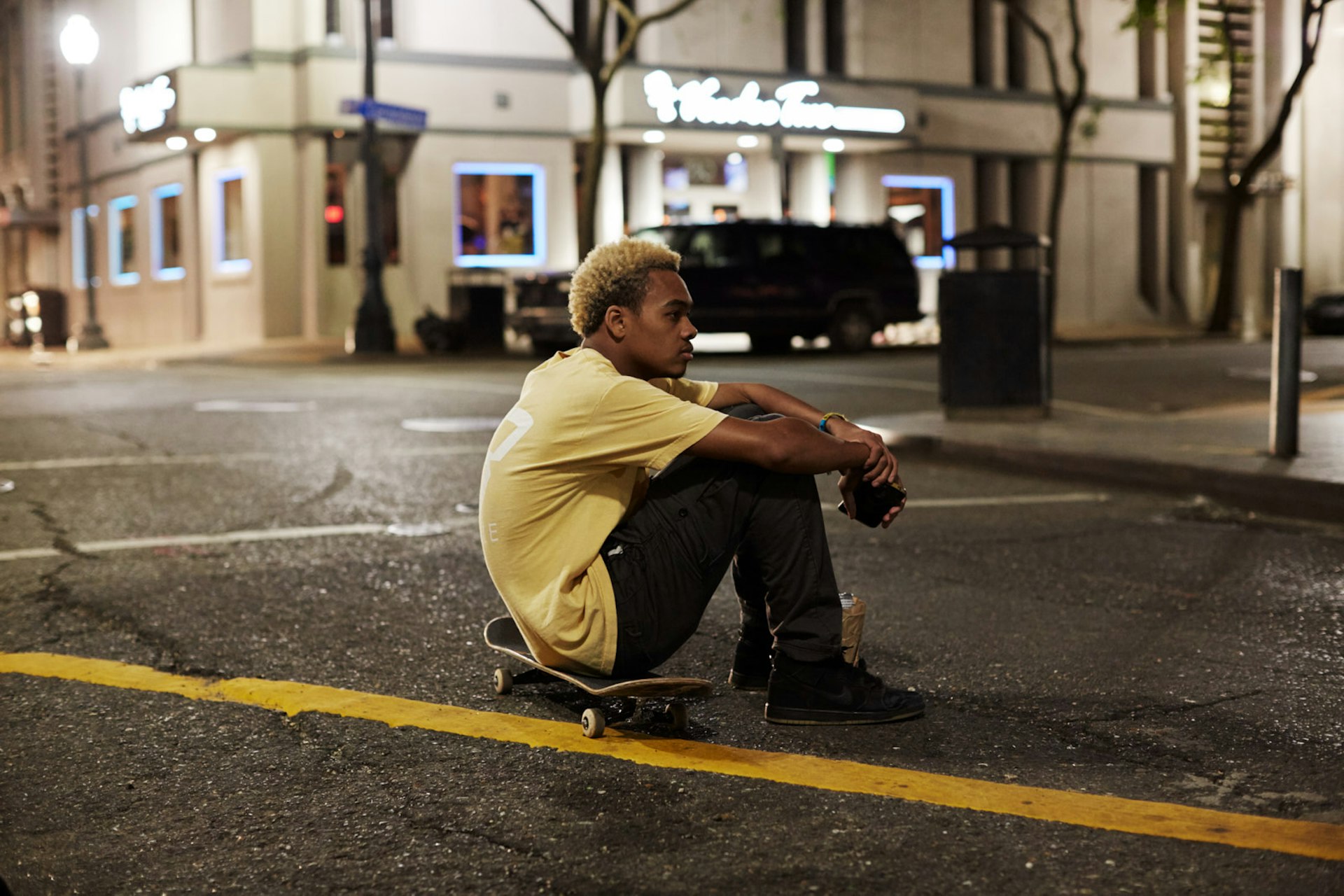
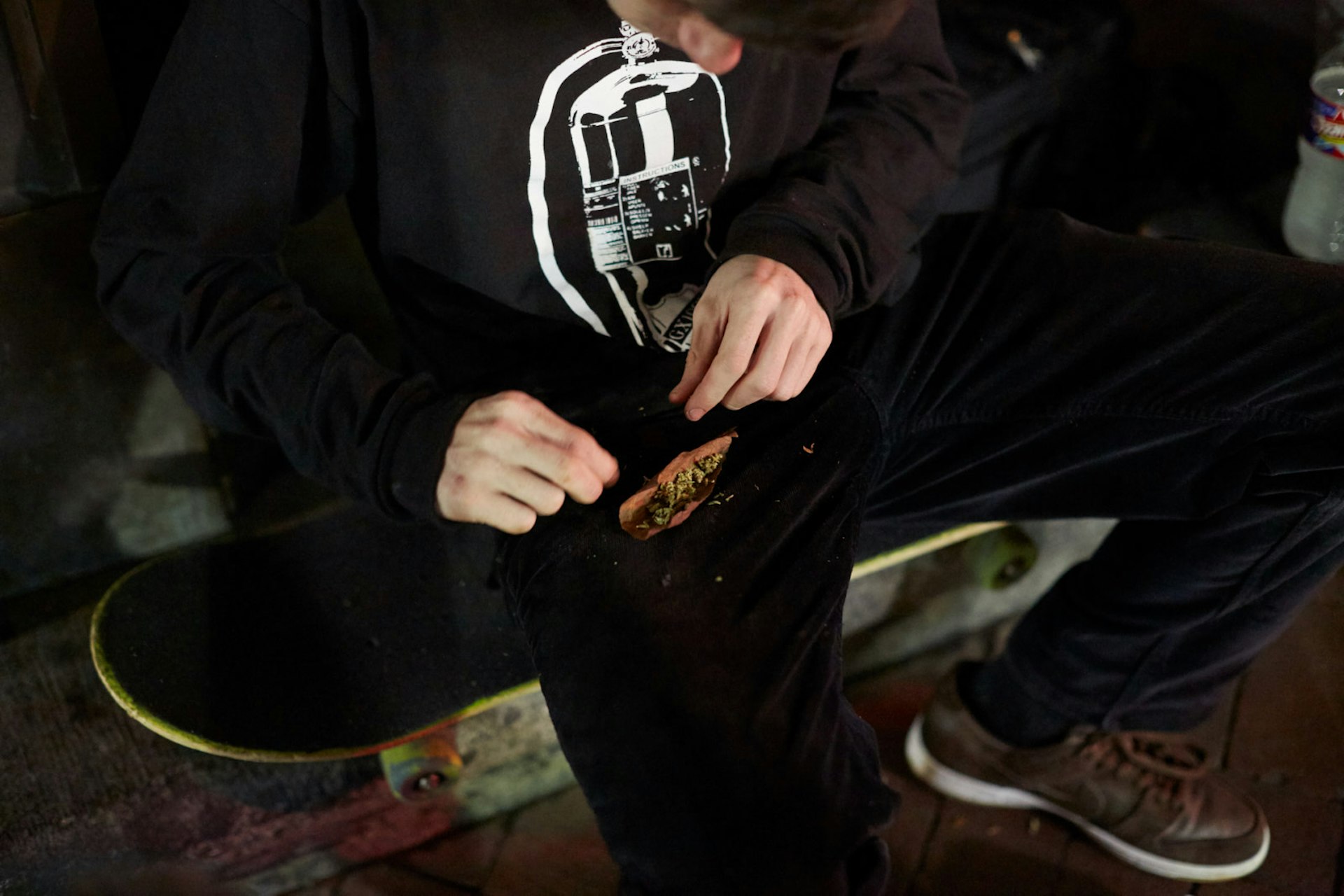
“Fuck a park,” says Troy. “It’s all about the streets.” When asked why, he replies: “I just like the naturalness. How grimy it is. [You can] literally skate anything. Some nights, come here and find anything, skate that shit.” Nearby, 23-year old Jamie ‘Jazz’ Hardy nods and waves an arm. “This is our shit. Our house.”
A security guard emerges from the belt of solid limestone that girds One Shell, a column of pale rock that underlines the muscular angularity of the office complex, where the tenants include the major economic players of Louisiana’s economy. Wells Fargo. Deloitte. Capital One. Shell Oil. The guard looks haggard. He holds his pants up by the belt, avoids eye contact with the guys and seems to shout into the night, “Y’all are good to skate on the street, but not on these steps, OK?”
The guard doesn’t wait on an answer as he walks back inside, but troy and the guys give him one. “It’s good,” someone says. “We ain’t skating on these steps. We on the street. Always on the street.”
Raul Buitrago is a 32-year-old filmmaker from Queens, New York who grew up skating in one of the epicentres of American skate culture. He’s been coming to New Orleans – decidedly not an epicentre of American skate culture – for a decade. Two years ago, he finally decided that he had to make a movie about skating in the Crescent City.
“New Orleans,” he says, “is fucking amazing. I feel like every time I’ve been there something unique was happening.” Raul wanted to capture what he found so irresistible about skating in a city that has barely any skating infrastructure. He got in touch with Humidity, the major skate shop in town, and via that outfit met Jazz, Troy and Jarred – the main subjects of Raul’s new documentary, Gnarleans.
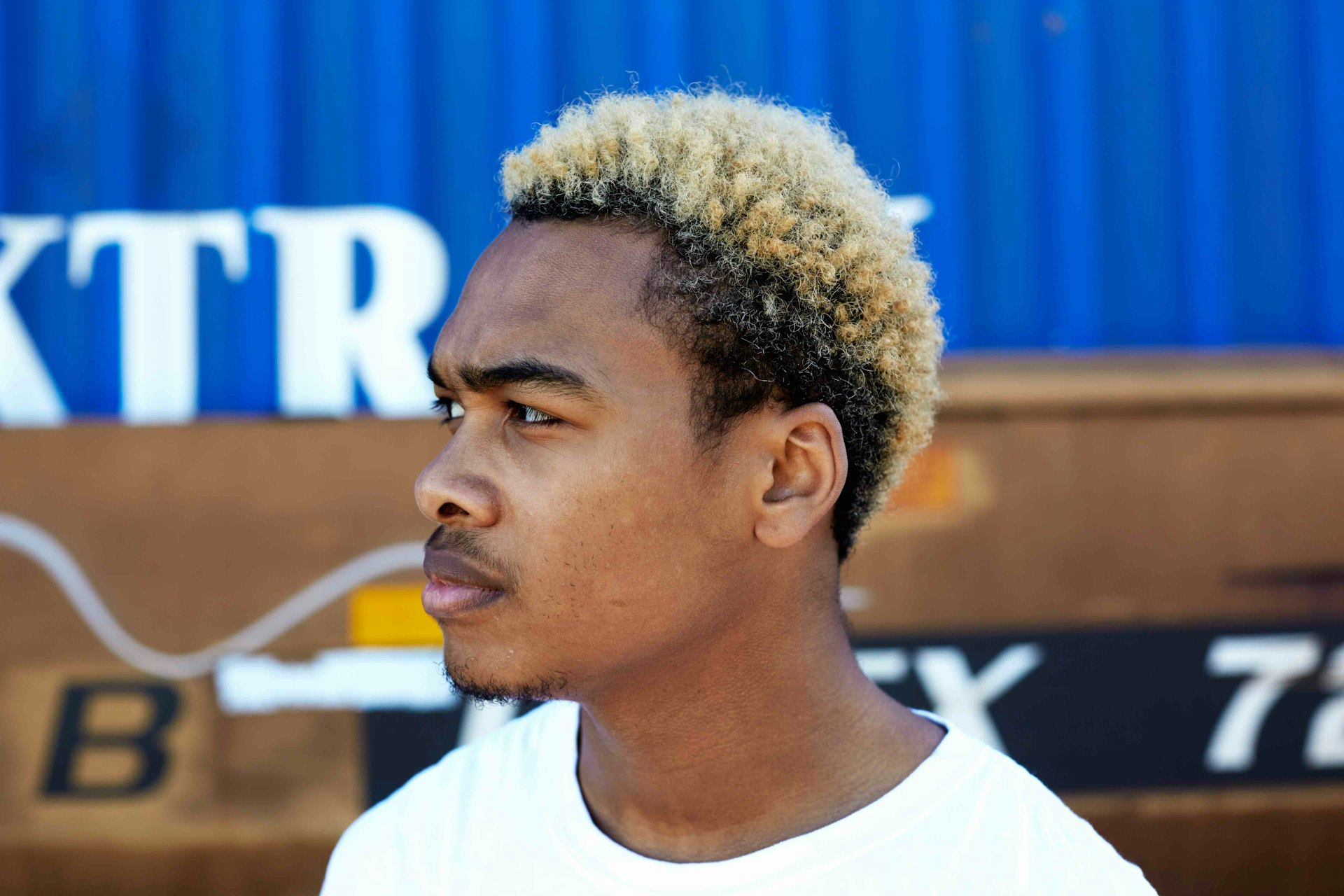
Troy stands at the train tracks beside the Parasite skatepark.
A running theme in the film is a contempt for all rules, an attitude that is in some ways as fundamental to this town as six-month-long summers and choking humidity. It’s a disregard for what others think, inevitably mixed with a young male bravado that is, of course, very concerned with what people think. But even then, the spirit of local skate culture is an anarchic one – not angry rebellion, but mischief carried out for the sheer fuck-the-world thrill of it.
In Gnarleans, no one ever misses the chance to buck authority. Early in the movie, when a guard finds some of the guys skating the top level of a chained off parking lot, they mumble an apology – then jump on their boards and carve slowly, in a Yeats-worthy gyre, down the levels of the garage to the freedom of the streets. The fact that the guys choose to skate around One Shell, as prominent a symbol of entrenched Louisiana power as any, and located across the street from a police station to boot, may not be a conscious gesture to those in power, but the symbology feels too blatant to ignore.
“There’s a natural disregard for laws in skating,” says Raul, who studied photography at NYU and got into film after starting to shoot music videos in 2013. “But down in New Orleans, they crank it up a notch. Just being there makes it feel a little more dangerous. Those dudes, when they mob, they mob in big numbers. It’s super wild west. They skate into traffic – sort of blindly skate into traffic. They’re fucking crazy.”
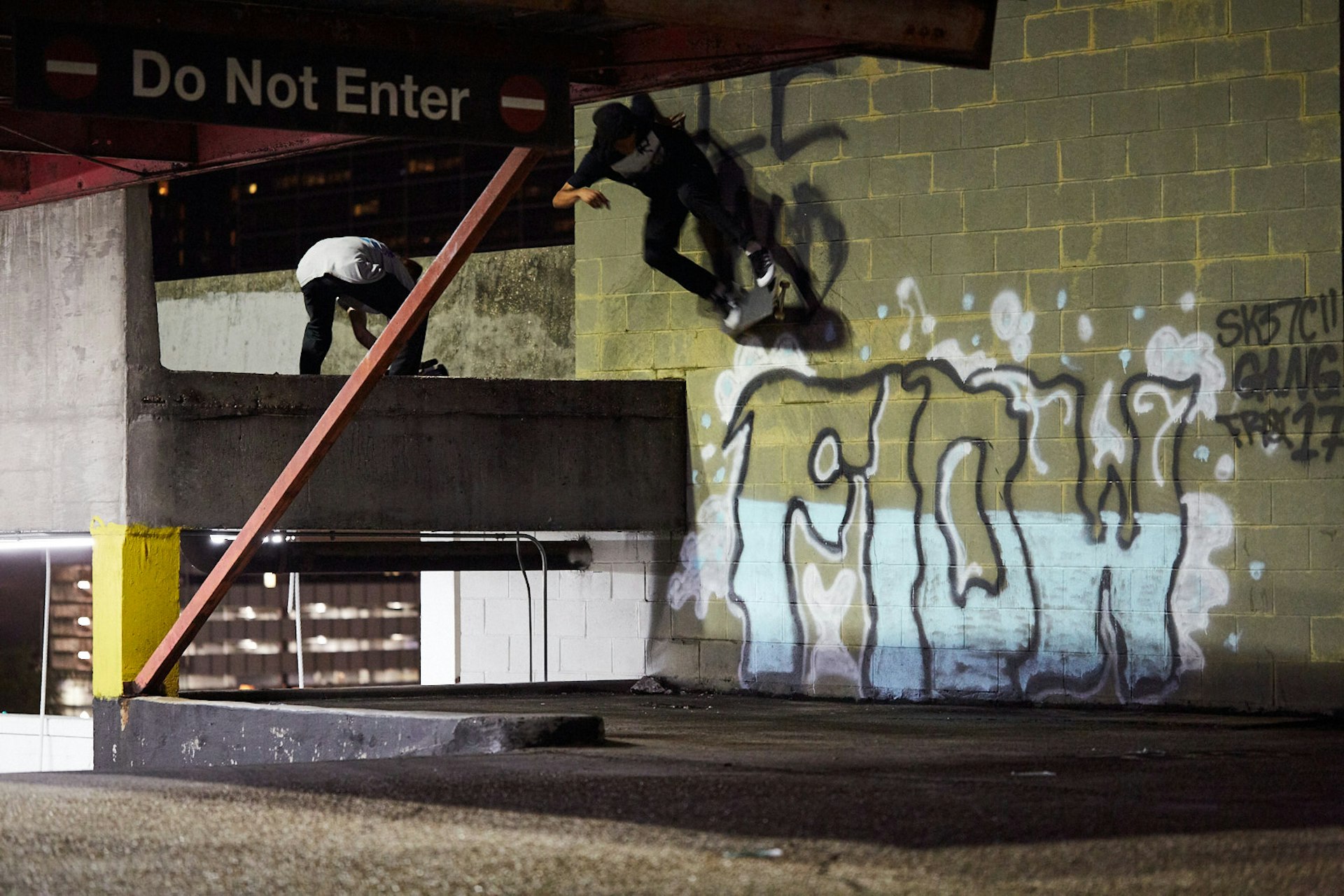
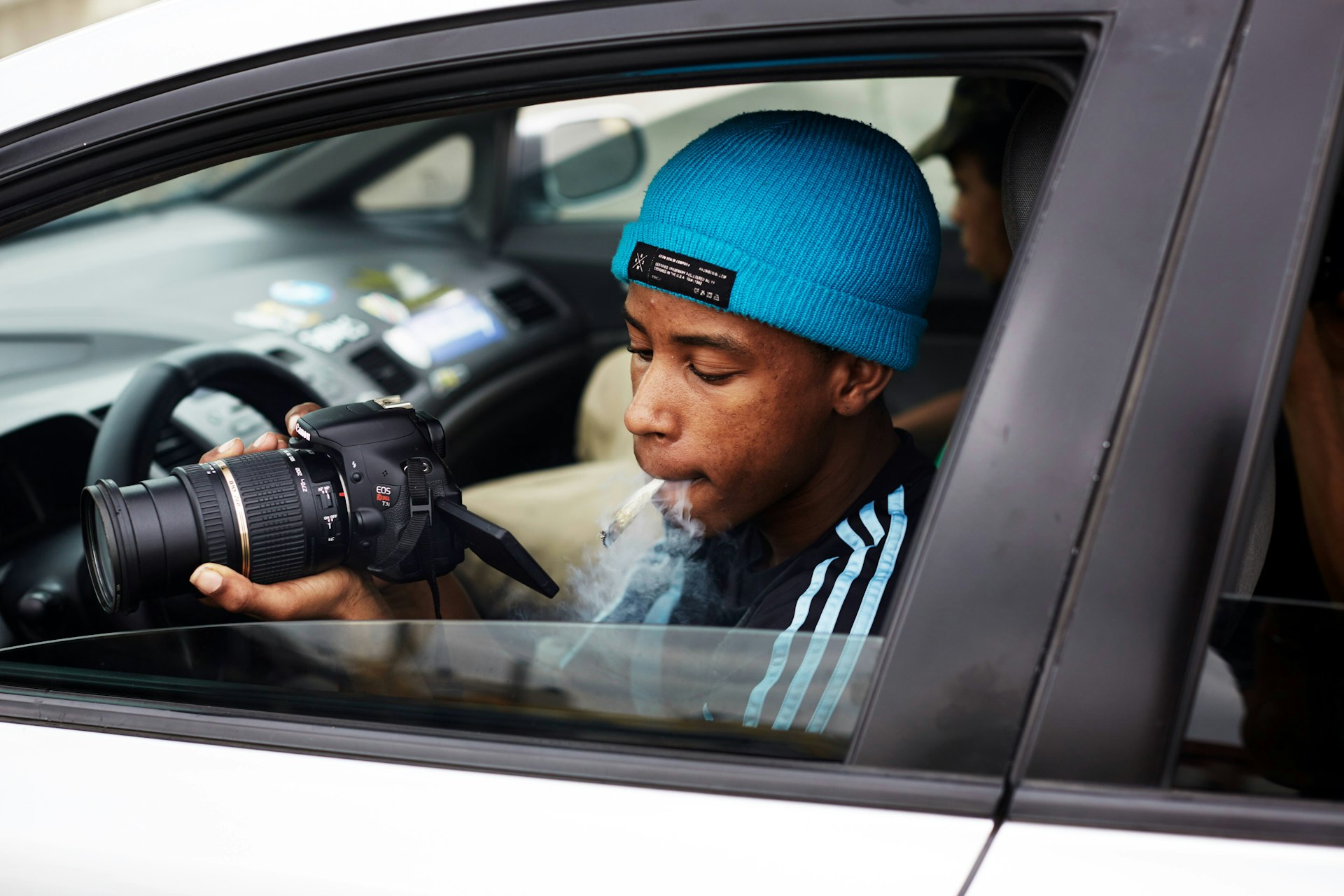
On a day off from work, Jarred sits with Jazz, smoking and talking, at a park on the Mississippi River.
In front of One Shell, Jazz fiddles with his hair. In Gnarleans he keeps it tightly braided, often with the help of his sister; tonight, it billows loose and wild in the humid breeze. For a group as anarchic as this, it’s hard to call anyone a true ‘leader’, but Jazz, who skates with the most unaffected confidence and speaks with the most unaffected charisma, fits the bill. He’s a natural, if understated, showman who records music on the side (some of which is featured in Gnarleans) and commands the unquestioned respect of this skating clique.
Yet for all those signs of leadership, Jazz has no love for authority. In fact what he appreciates most about skating in New Orleans is the freedom that the city affords. This is a place where you can order your drink to go from a bar, where the most famous holiday – Mardi Gras – is very much rooted in an old tradition of giving the masses a day to get drunk and thumb their noses at the powers that be.
“You can’t go to other States and be out like, after 10 or something,” says Troy, sitting on the steps of One Shell. “Out here? I go to skate at four in the morning. We used to be lurked out all night.”
Troy tells stories of late night adventures: of sneaking into bars and flirting with girls at Tulane, a nearby prestigious college that attracts the children of wealthy families from the Northeast and West Coast. But these days, it’s not all late-night hijinks; Troy is a furious multitasker, balancing a day job and a vigorous study schedule as he works towards a demanding degree in Petroleum Engineering at the University of New Orleans. He attributes some of his focus and work ethic to his extended family. Unlike many Americans, but like many New Orleanians, Troy grew up in a multi-generational household, surrounded by grannies and aunties who weren’t afraid to lay down the love or the law.
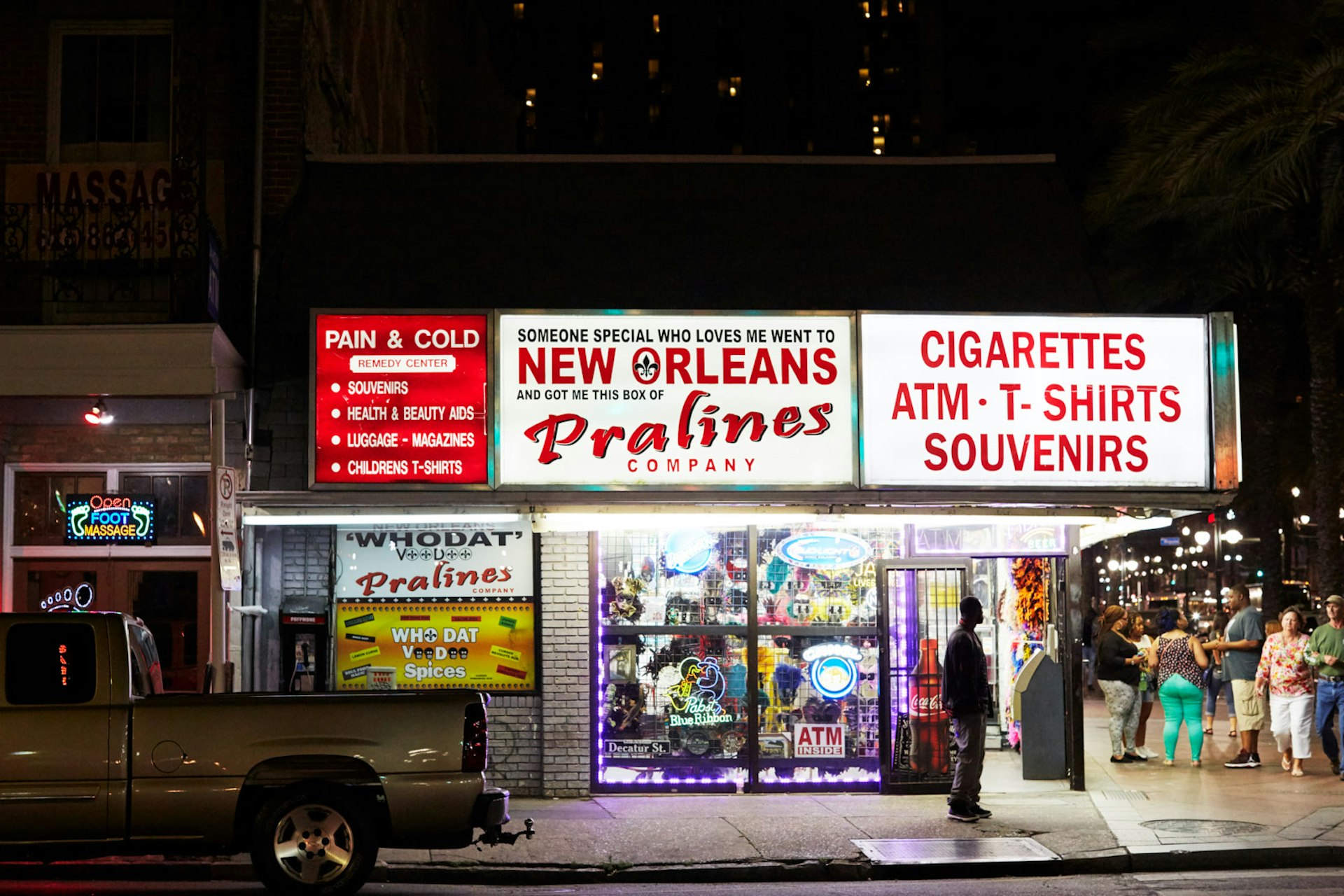
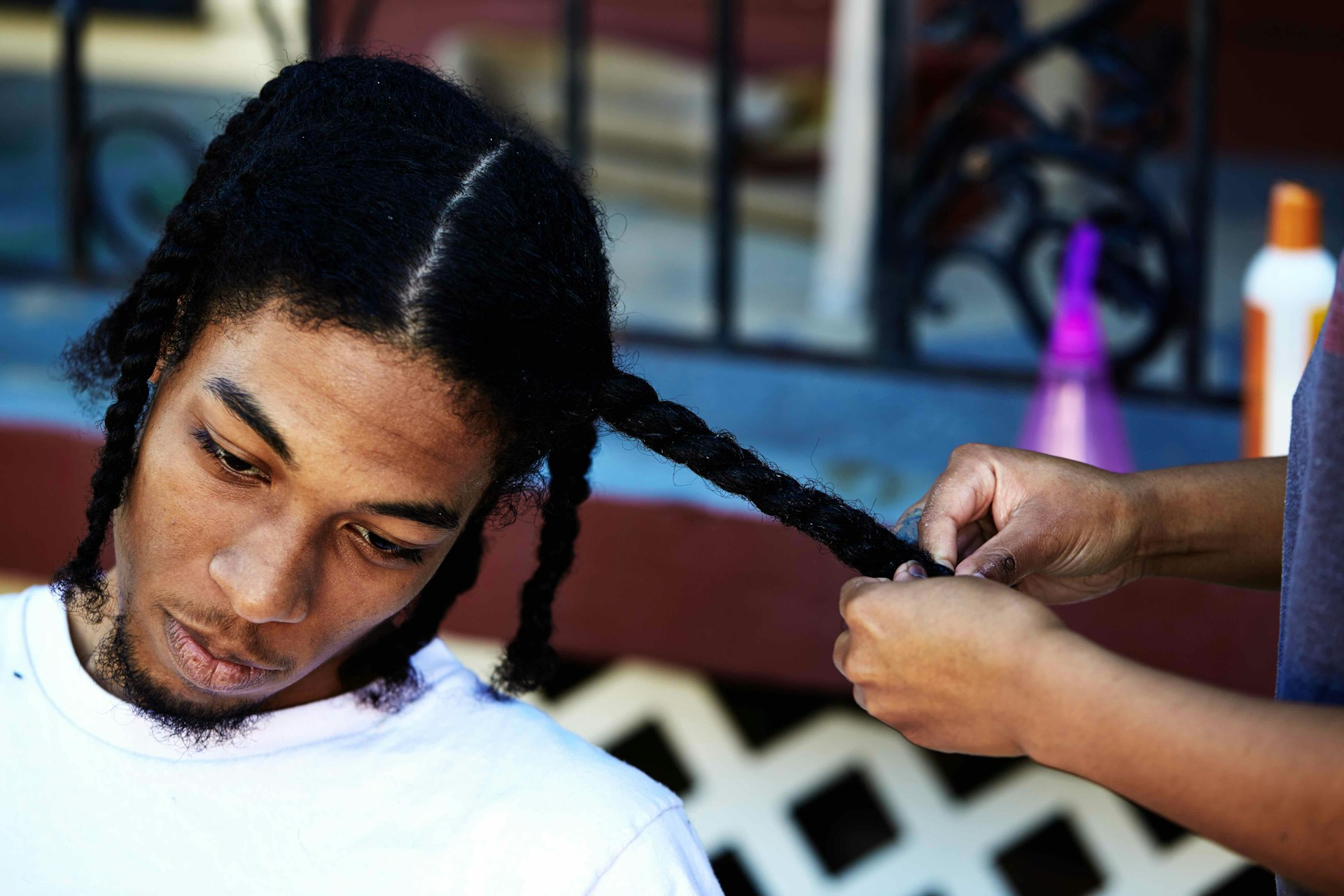
Jazz gets his hair braided by his sister Neecey while sitting in her backyard.
As Troy talks, crowds stroll by on the street clutching plastic souvenir cups from various Bourbon St bars. It’s a big weekend for college football – Louisiana State University versus Alabama – and the young, primarily African-American skaters are rolling and hopping around a pedestrian crowd of old, primarily white college football fans.
For all that, everyone seems to let everyone else do their thing – a foundational corollary to the chaos of New Orleans. A husband might move a little closer to his wife as they walk through the skating corridor, but the guys are always careful to give pedestrians a wide berth, especially children. One woman smiles and yells at the guys, “It smells like weed,” and one of the skaters yells back, “It smells you too,” which gets a big laugh. As Jarred says, “It’s pretty much One Love out here.”
That’s not to say it’s always safe. Sometimes one of the guys will grab onto a car bumper and allow himself to be dragged through the busy streets of the Central Business District. Jarred says that particular move garners different reactions; some drivers indulge the skaters, some have pulled guns on them.
The guys are nonchalant about pulling off this sort of move, but it’s a practised nonchalance. One suspects they realise how death-defying these tricks are, even if they might never admit it. There’s a moment in Gnarleans where, after watching one of the skaters get pulled through the streets, a random pedestrian says, “Coolest thing I’ve ever seen in my whole fucking life”. One of the skaters smirks and shoots back, “You got a boring ass life.”
![]()
Jarred Dearmas – a skinny, slight and always smiling 22-year old – is attempting a kickflip when one of New Orleans’ many party buses rolls by. These passenger vehicles are rented out by drunken revellers for the express purpose of drifting through the city, the stereo cranked to 11. This particular bus rolls as a convertible, pumping out the ‘triggerman’ backbeat of New Orleans bounce: a hyper-frenetic local genre of dance music. The people in the bus are all white.
‘Scooter,’ a friend of Jazz, Troy and Jarred’s, laughs. “They got white people in that shit? They gentrifying the party buses!”
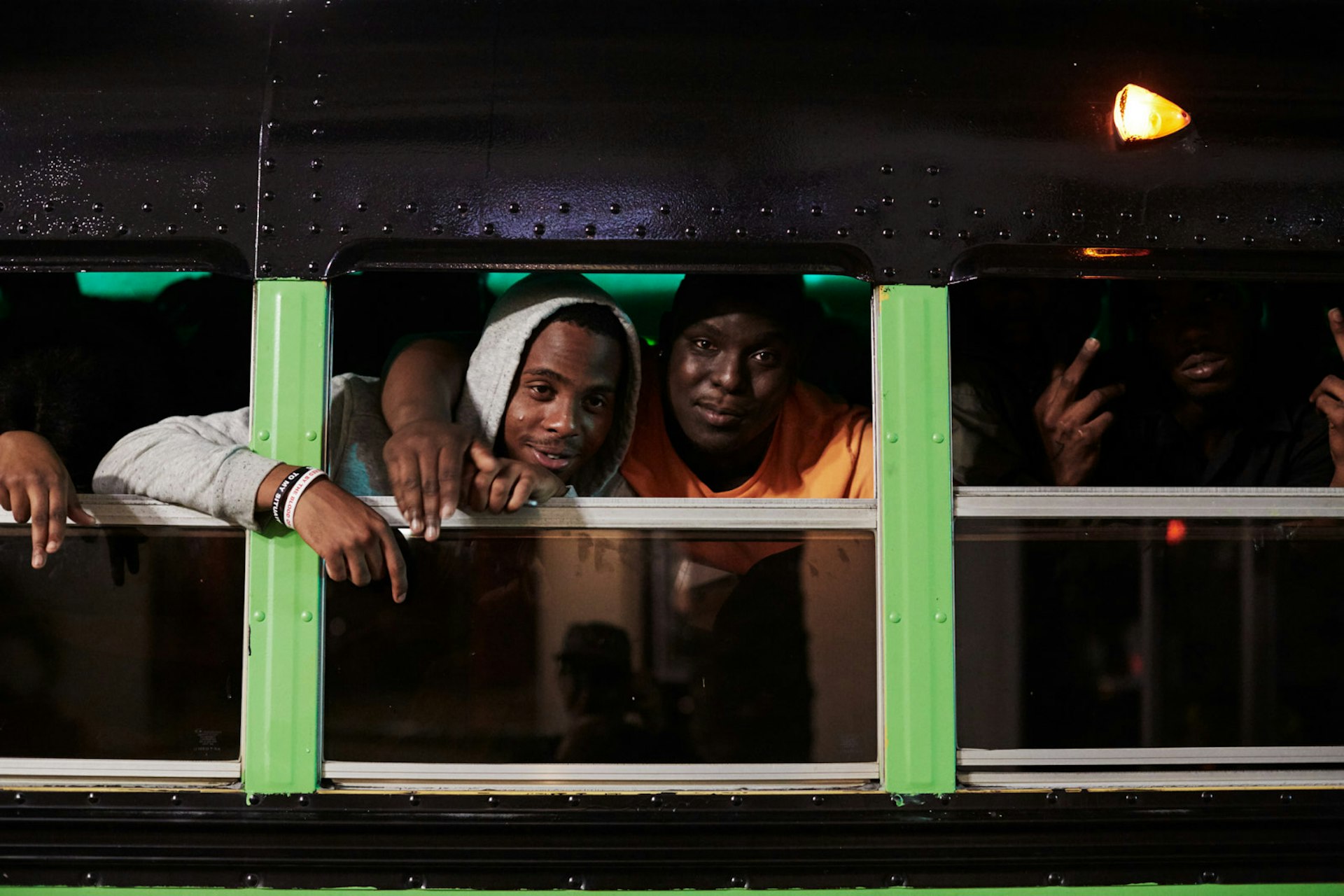
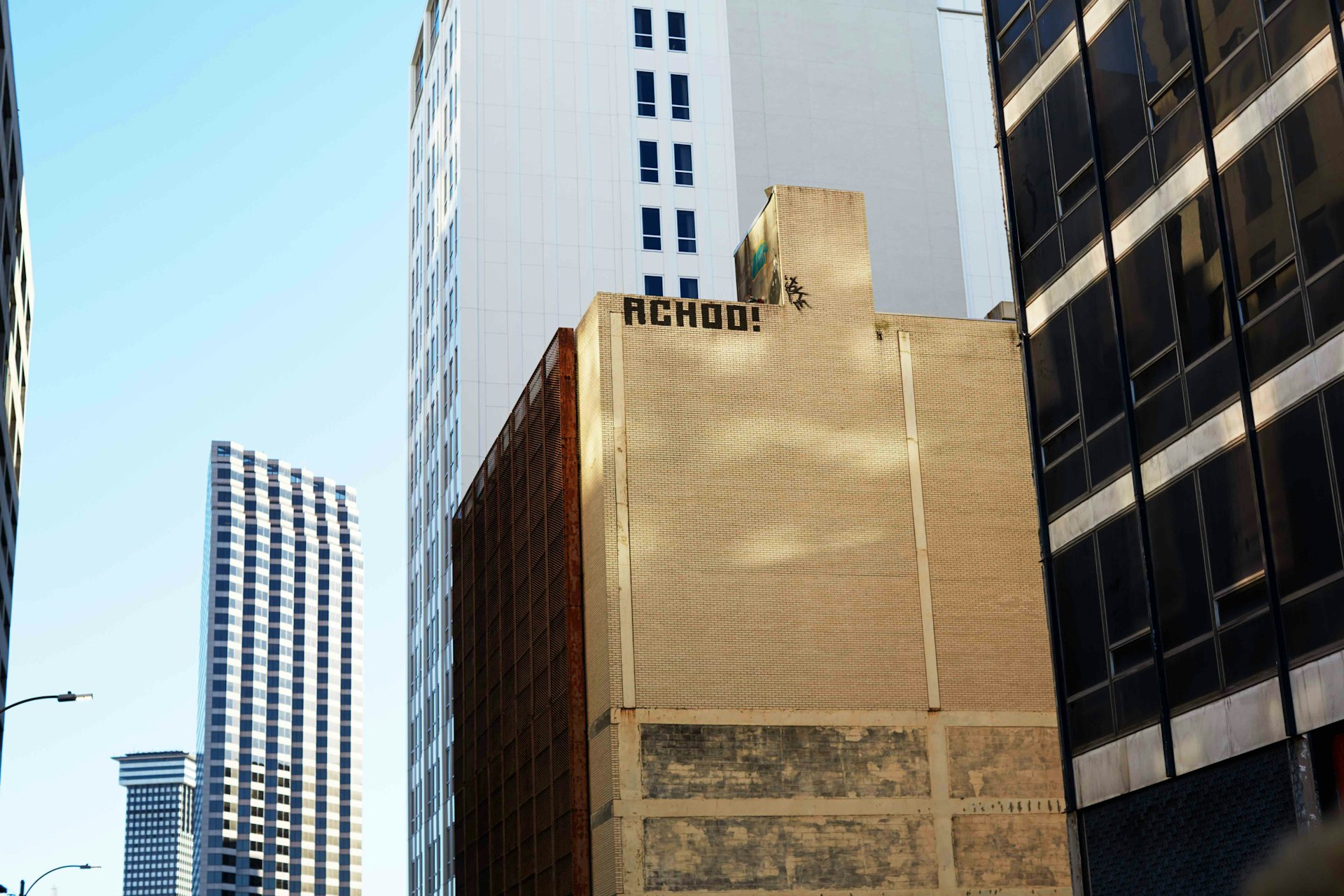
Central Business District, while walking around with Troy. Troy would often point out graffiti he has spotted, and who it was done by.
The others chuckle, prompting a conversation about gentrification. “Shit got different, son,” says Jazz. “Projects getting torn down and turned into fucking condos and shit.”
“You really do see white people walking their dogs at night,” says Troy. “In the hood. In the trenches! That stereotype is real.”
Of course, gentrification is happening in cities all across the USA, but it was accelerated here by Hurricane Katrina. It’s one thing to watch new people move into the neighbourhood; it’s another to see them move into homes where your neighbours, friends and family drowned.
An important side-note about New Orleans: it’s widely accepted that Katrina was a man-made disaster; the storm itself came from Mother Nature, but the city’s ill-preparedness, the weakness of the levee system, as well as the slow federal emergency response, are attributed to human error.
But while New Orleans naturally makes room for kids carving up curb and adults drinking out of go-cups, you could also argue that it makes space for the sort of lawlessness and infrastructural deficiencies that hold so many New Orleanians back, that made a disaster like Katrina was somewhat inevitable. In a city without rules, no one tells you what to do, but there can be precious few official avenues for getting ahead. “That’s the dark side of freedom,” says Jazz.
All of the guys hustle for work, and all of them complain about how hard it can be to find employment. Jazz drives a school bus; Troy works at a floor-and-tile sales warehouse; Jarred slings grease at a fast food chain. No one considers their paid work particularly rewarding.
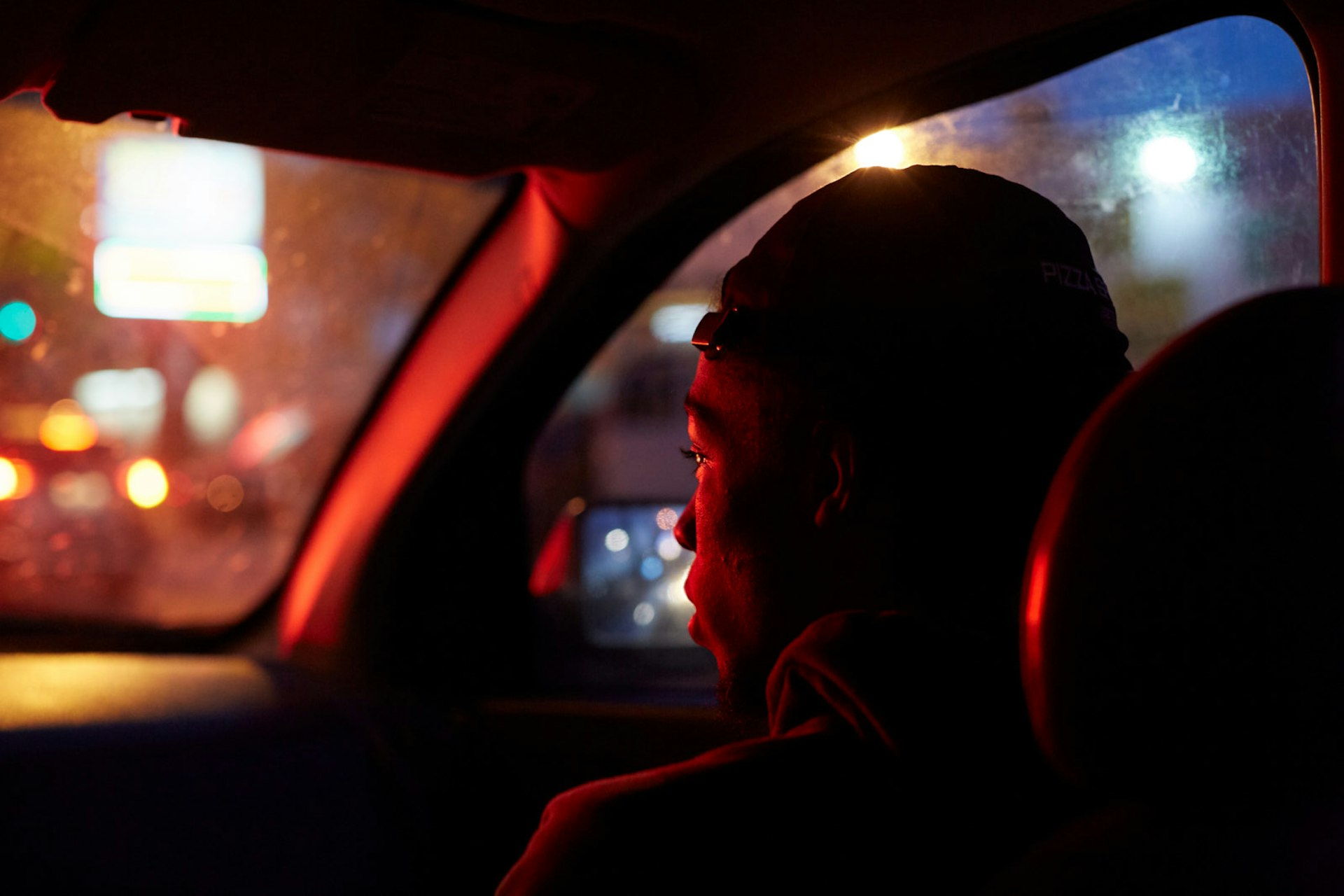
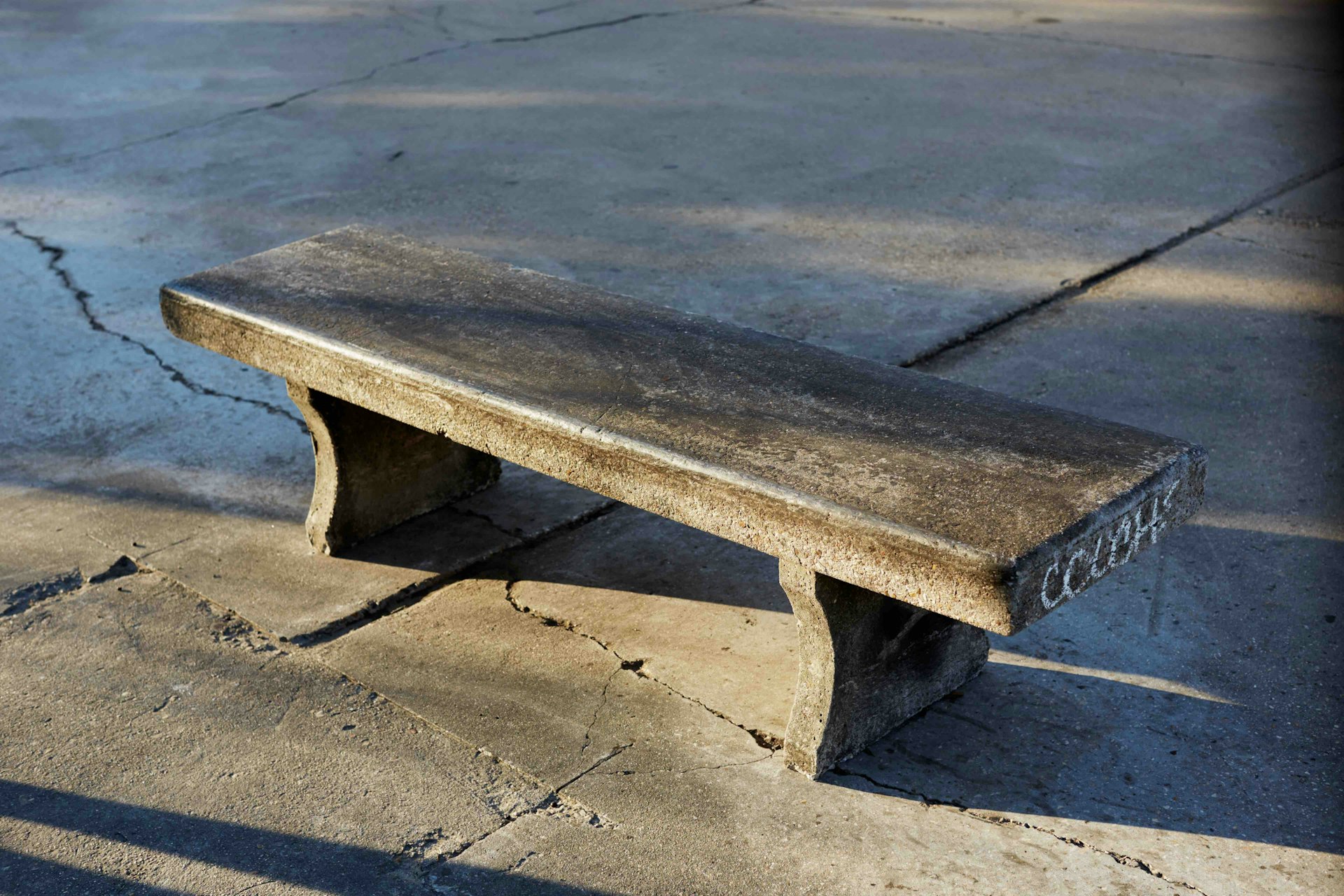
A bench at the Parasite DIY skatepark on Pleasure Street, between the St.Bernard and Fairgrounds neighbourhoods.
All of the guys have dealt with gun violence that has hit too close to home. Jazz’s brother was only recently released from prison for killing a man. Troy saved the life of one of his cousins by staunching the blood pouring out of a gunshot wound. Jarred’s father was gunned down when he was a little boy. In one of the more moving scenes in Gnarleans, Jarred, who has a grin that lights up a room, says of his father, “I understand he’s gone and all that, so I ain’t gonna get emotional about it when I talk about it. But sometimes I’m not allowed to think about it hard. You get emotional. I cry sometimes, I ain’t gonna lie.”
It’s tempting to think that skating may have spared these guys from the crime and violence that claims so many young people in New Orleans. But when asked if that might be the case, Jarred pops his big smile and says, “Naaah. I wasn’t ever into that stuff.” He prefers to talk about his love of rock, in all forms (“I fuck with Nickelback,” he says), and photography especially.
Before he skated, Jarred played sports, but like everyone else, he hated being told what to do, and when. A neighbourhood acquaintance taught Jarred to skate, a hobby that synced surprisingly well to his love of film.
“I feel like skating opened my mind to a lot of other things. When I first started, I was in sports mode – and that wasn’t really creative. And when I started skating I wasn’t even into editing or anything – but now we’re making funny little videos of each other.” He pauses, lining up a shot. “I like it – rewatching what we do.”
Like Jarred, Jazz and Troy were good kids. With or without skating, they all avoided the considerable dangers of New Orleans’ streets. Skating just happened to come along and provide something special: the freedom that all the guys crave, plus a capacity for self-improvement.
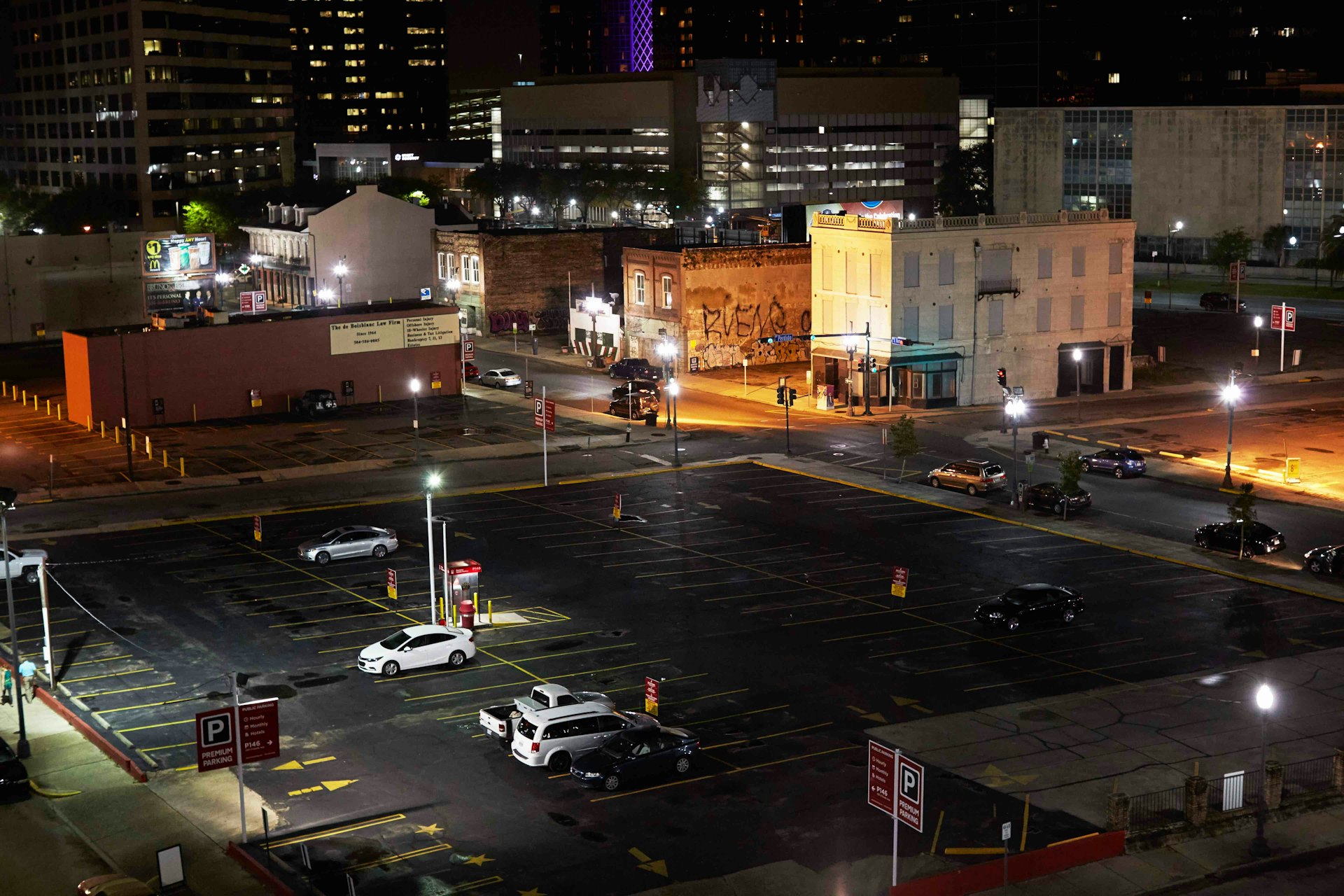
A rooftop in the Central Business District, New Orleans, where skaters treat buildings as their personal playground.
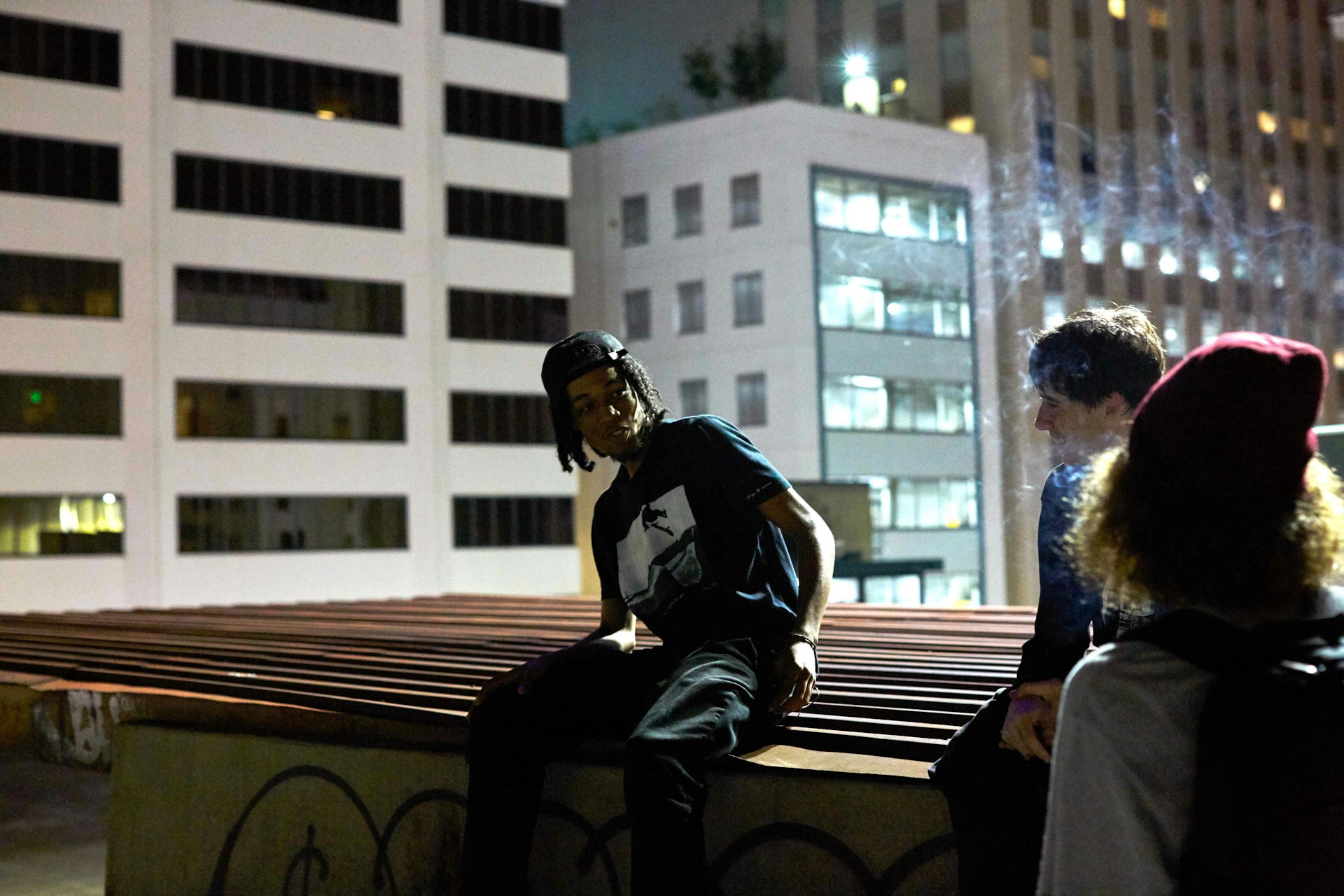
Jazz talks with friends Peyton and Dominic atop a nearby parking garage.
“Skating is fun as fuck,” says Jazz. “I like the vehicle. Doing tricks, going fast, all that. I like the feeling, the rush, you know. I’m free, I can do whatever I want. Plus, if you pay attention, skateboarding teaches you a lot of shit that’s not directly related to a piece of wood: fucking focus.” Troy nods. “Shit teaches you the art of putting in work.”
As everyone mumbles in agreement, another party bus rolls by, prompting more laughs about gentrification. In general, the guys don’t mind the new side to New Orleanians – they all agree the city feels safer post-Katrina. Their main gripe is with newcomers who take advantage of the city’s ‘anything goes’ attitude, only to then attempt to dictate the culture of their new home. It’s a particularly tetchy issue in a city that, more than anywhere else in the USA, has maintained deep, palpable ties to the folkways of the Caribbean and West Africa.
“First they vulture, then they fuck up the culture,” says Jazz. Anyone can live in New Orleans, he believes, but don’t choose to do so unless you love what’s fundamental to the city.
“There are people in this motherfucker complaining about beads on the ground for Mardi Gras,” says Jazz. “What? You better eat a dick. Go back to fucking Nebraska. If you ain’t come here for this shit? Man, you better get out of here, son.”
Troy agrees enthusiastically. He talks about living in Texas, where – like thousands of other New Orleanians – he and his family were exiled for a few years in the wake of Katrina. Troy hated that time. He says that in his heart, he kept longing for – holding out his hands to illustrate – “this”: these streets, this attitude, this city.
“I could live somewhere else, but it’s just not the same. You ever see Avatar? How the Navi are like, connected to the tree? The city [is] like the tree. We all connected to the tree.” A security guard emerges from One Shell, looks at the guys, walks back inside, and Troy breathes. “It’s forever our city.”
Watch Gnarleans on Wolf Council Films from 16 March.
This article appears in Huck: The Flying Lotus Issue. Buy it in the Huck shop or subscribe to make sure you never miss another issue.
